Background
Douglas Mark Rushkoff was born on February 18, 1961, in New York City, New York, the United States to Marvin (a hospital administrator) and Sheila (a psychiatric social worker) Rushkoff.


2004
The Century Plaza, 2025 Avenue of the Stars, Los Angeles, CA 90067, United States
Douglas Rushkoff speaks during the Television Critics Association Press Tour at the Westin Century Plaza Hotel on July 8, 2004 in Century City, California. (Photo by Frederick M. Brown/Getty Images).

2013
St. Entrance, 500 E Cesar Chavez St #4th, Austin, TX 78701, United States
Douglas Rushkoff speaks onstage at Present Shock: When Everything Happens Now during the 2013 SXSW Music, Film + Interactive Festival at Austin Convention Center on March 9, 2013 in Austin, Texas. (Photo by Waytao Shing/Getty Images for SXSW)

2013
St. Entrance, 500 E Cesar Chavez St #4th, Austin, TX 78701, United States
Douglas Rushkoff speaks onstage at Present Shock: When Everything Happens Now during the 2013 SXSW Music, Film + Interactive Festival at Austin Convention Center on March 9, 2013 in Austin, Texas. (Photo by Waytao Shing/Getty Images for SXSW)

2014
New York City, New York, United States
Laura Adams, Douglas Rushkoff, Casey Carey, Serena Potter, Rachel Pasqua and Matt Lawson speak onstage at the Why Winning in Mobile is About Behavior, Not Technology panel during AWXI on September 29, 2014 in New York City. (Photo by Mike Pont/Getty Images for AWXI)

2019
New York City, New York, United States
Douglas Rushkoff, media culture professor at New York University, speaks during the Techonomy conference in New York, U.S., on Wednesday, May 15, 2019. The conference brings together veteran tech investors, big company executives, as well as startup founders in finance, health, security and retail to discuss how business and tech can be the key to bringing the entire world together. Photographer: Wes Bruer/Bloomberg via Getty Images

2019
New York City, New York, United States
Douglas Rushkoff, media culture professor at New York University, speaks during the Techonomy conference in New York, U.S., on Wednesday, May 15, 2019. The conference brings together veteran tech investors, big company executives, as well as startup founders in finance, health, security and retail to discuss how business and tech can be the key to bringing the entire world together. Photographer: Wes Bruer/Bloomberg via Getty Images
2004
The Century Plaza, 2025 Avenue of the Stars, Los Angeles, CA 90067, United States
Douglas Rushkoff speaks during the Television Critics Association Press Tour at the Westin Century Plaza Hotel on July 8, 2004 in Century City, California. (Photo by Frederick M. Brown/Getty Images).
2006
251 Mercer St #801, New York, NY 10012, United States
Douglas Rushkoff poses for a portrait in a New York University classroom on May 11, 2006 in New York City. (Photo by Johannes Kroemer/Getty Images)
2006
251 Mercer St #801, New York, NY 10012, United States
Douglas Rushkoff poses for a portrait in an New York University classroom on May 11, 2006 in New York City. (Photo by Johannes Kroemer/Getty Images)
2006
251 Mercer St #801, New York, NY 10012, United States
Douglas Rushkoff poses for a portrait in an New York University classroom on May 11, 2006 in New York City. (Photo by Johannes Kroemer/Getty Images)
2013
St. Entrance, 500 E Cesar Chavez St #4th, Austin, TX 78701, United States
Douglas Rushkoff speaks onstage at Present Shock: When Everything Happens Now during the 2013 SXSW Music, Film + Interactive Festival at Austin Convention Center on March 9, 2013 in Austin, Texas. (Photo by Waytao Shing/Getty Images for SXSW)
2013
St. Entrance, 500 E Cesar Chavez St #4th, Austin, TX 78701, United States
Douglas Rushkoff speaks onstage at Present Shock: When Everything Happens Now during the 2013 SXSW Music, Film + Interactive Festival at Austin Convention Center on March 9, 2013 in Austin, Texas. (Photo by Waytao Shing/Getty Images for SXSW)
2014
New York City, New York, United States
Laura Adams, Douglas Rushkoff, Casey Carey, Serena Potter, Rachel Pasqua and Matt Lawson speak onstage at the Why Winning in Mobile is About Behavior, Not Technology panel during AWXI on September 29, 2014 in New York City. (Photo by Mike Pont/Getty Images for AWXI)
2018
Times Square, Manhattan, NY 10036, United States
Douglas Rushkoff on Times Square, New York City on March 12, 2018.
2019
New York City, New York, United States
Douglas Rushkoff, media culture professor at New York University, speaks during the Techonomy conference in New York, U.S., on Wednesday, May 15, 2019. The conference brings together veteran tech investors, big company executives, as well as startup founders in finance, health, security and retail to discuss how business and tech can be the key to bringing the entire world together. Photographer: Wes Bruer/Bloomberg via Getty Images
2019
New York City, New York, United States
Douglas Rushkoff, media culture professor at New York University, speaks during the Techonomy conference in New York, U.S., on Wednesday, May 15, 2019. The conference brings together veteran tech investors, big company executives, as well as startup founders in finance, health, security and retail to discuss how business and tech can be the key to bringing the entire world together. Photographer: Wes Bruer/Bloomberg via Getty Images
Princeton University, Princeton, NJ 08544, United States
Rushkoff graduated from Princeton University in 1983.
24700 McBean Pkwy, Valencia, CA 91355, United States
Rushkoff completed a Master of Fine Arts in Directing from the California Institute of the Arts.
Domplein 29, 3512 JE Utrecht, The Netherlands
Rushkoff was a PhD candidate at Utrecht University's New Media Program, writing a dissertation on new media literacies, which was approved in June 2012.
Douglas Rushkoff (Photo by Mychal Watts/WireImage)
1950 Bathurst St, Toronto, ON M5P 3K2, Canada
Douglas Rushkoff, author of Nothing Sacred: The Truth About Judaism, photographed before his talk at the Holy Blossom Temple. (Photo by Tony Bock/Toronto Star via Getty Images)

















(Acclaimed writer and thinker Douglas Rushkoff, author of ...)
Acclaimed writer and thinker Douglas Rushkoff, author of Ecstasy Club and Coercion, has written perhaps the most important - and controversial - book on Judaism in a generation. As the religion stands on the brink of becoming irrelevant to the very people who look to it for answers, Nothing Sacred takes aim at its problems and offers startling and clearheaded solutions based on Judaism’s core values and teachings. Disaffected by their synagogues’ emphasis on self-preservation and obsession with intermarriage, most Jews looking for an intelligent inquiry into the nature of spirituality have turned elsewhere, or nowhere.
https://www.amazon.com/Nothing-Sacred-Truth-About-Judaism/dp/1400051398/?tag=2022091-20
1973
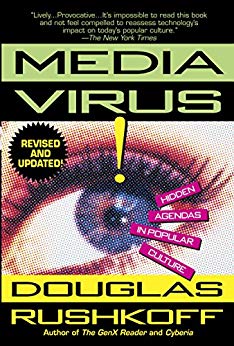
(The most virulent viruses today are composed of informati...)
The most virulent viruses today are composed of information. In this information-driven age, the easiest way to manipulate the culture is through the media. A hip and caustically humorous McLuhan for the '90s, culture watcher Douglas Rushkoff now offers a fascinating expose of media manipulation in today's age of instant information.
https://www.amazon.com/Media-Virus-Agendas-Popular-Culture-ebook/dp/B004CFAWCK/?tag=2022091-20
1994
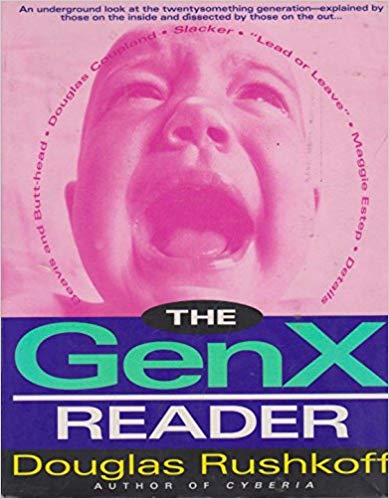
(Cursed by older generations, Generations X means a lot of...)
Cursed by older generations, Generations X means a lot of things to a lot of people. They are a culture, a demographic, an outlook, a style, an economy, a scene, a literature, a political ideology, an aesthetic, an age, a decade, and a way of life. Here is a collage of the most revered voices of Generation X, demonstrating that while twentysomethings may, indeed, have dropped out of American culture (as it is traditionally defined), they also stand as a testament to American ingenuity, optimism, instinct, and intelligence.
https://www.amazon.com/GenX-Reader-Douglas-Rushkoff/dp/0345390466/?tag=2022091-20
1994
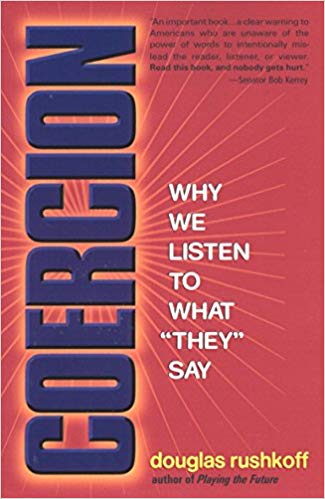
(Noted media pundit and author of Playing the Future Dougl...)
Noted media pundit and author of Playing the Future Douglas Rushkoff gives a devastating critique of the influence techniques behind our culture of rampant consumerism. With a skilled analysis of how experts in the fields of marketing, advertising, retail atmospherics, and hand-selling attempt to take away our ability to make rational decisions, Rushkoff delivers a bracing account of media ecology today, consumerism in America, and why we buy what we buy, helping us recognize when we're being treated like consumers instead of human beings.
https://www.amazon.com/Coercion-Why-Listen-What-They/dp/157322829X/?tag=2022091-20
1998

(This is the moment we’ve been waiting for, explains award...)
This is the moment we’ve been waiting for, explains award-winning media theorist Douglas Rushkoff, but we don’t seem to have any time in which to live it. Instead we remain poised and frozen, overwhelmed by an always-on, live-streamed reality that our human bodies and minds can never truly inhabit. And our failure to do so has had wide-ranging effects on every aspect of our lives.
https://www.amazon.com/Present-Shock-When-Everything-Happens-dp-1591844762/dp/1591844762/?tag=2022091-20
2004
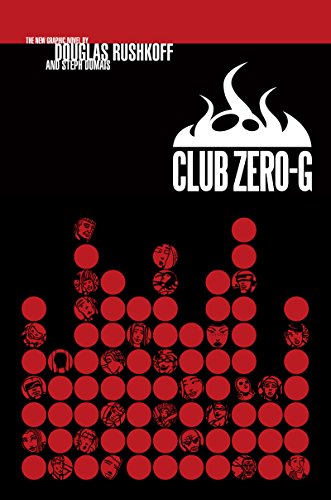
(Douglas Rushkoff, author of eight books on media and cult...)
Douglas Rushkoff, author of eight books on media and culture, as well as the novels Ecstasy Club and Exit Strategy, marks his graphic novel debut with Club Zero-G. Teaming with Canadian independent comic artist Steph Dumais, Rushkoff has delivered America's answer to Japan's animé: a mind-altering journey into a universe where consensus reality is up for grabs.
https://www.amazon.com/Club-Zero-G-Douglas-Rushkoff-ebook/dp/B00LGSZORY/?tag=2022091-20
2004
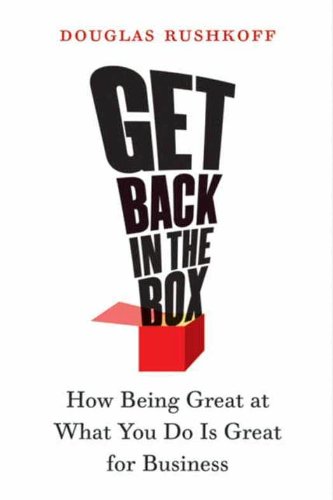
(Douglas Rushkoff was one of the first social commentators...)
Douglas Rushkoff was one of the first social commentators to identify the new culture around the internet. He has spent nearly a decade advising companies on the ways they can re-orient their businesses to the transformations the internet has caused. Through his speaking and consulting, Rushkoff has discovered an important and unrecognized shift in American business. Too many companies are panicked and operating in survival mode when the worst of the crisis has already passed
https://www.amazon.com/Get-Back-Box-Being-Business-ebook/dp/B003WJRE6E/?tag=2022091-20
2005
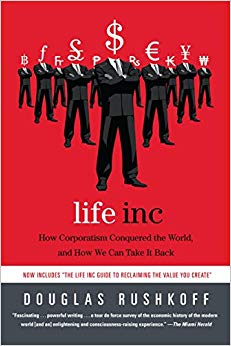
(Life Inc explains why we see our homes as investments rat...)
Life Inc explains why we see our homes as investments rather than places to live, our 401(k) plans as the ultimate measure of success, and the Internet as just another place to do business. Most important, Rushkoff illuminates both how we’ve become disconnected from our world and how we can reconnect to our towns, to the value we can create, and, mostly, to one another. As the speculative economy collapses under its own weight, Life Inc shows us how to build a real and human-scaled society to take its place.
https://www.amazon.com/Life-Inc-Corporatism-Conquered-World/dp/0812978501/?tag=2022091-20
2009
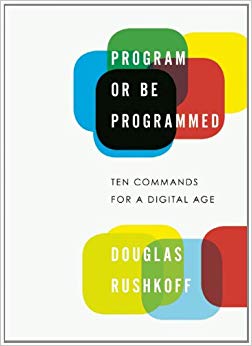
(The debate over whether the Net is good or bad for us fil...)
The debate over whether the Net is good or bad for us fills the airwaves and the blogosphere. But for all the heat of claim and counter-claim, the argument is essentially beside the point: It’s here; it’s everywhere. The real question is, do we direct technology, or do we let ourselves be directed by it and those who have mastered it?
https://www.amazon.com/Program-Be-Programmed-Commands-Digital/dp/159376426X/?tag=2022091-20
2010
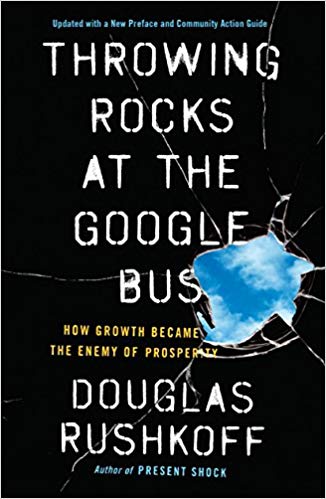
(In this groundbreaking book, acclaimed media scholar and ...)
In this groundbreaking book, acclaimed media scholar and author Douglas Rushkoff tells us how to combine the best of human nature with the best of modern technology. Tying together disparate threads - big data, the rise of robots and AI, the increasing participation of algorithms in stock market trading, the gig economy, the collapse of the eurozone - Rushkoff provides a critical vocabulary for our economic moment and a nuanced portrait of humans and commerce at a critical crossroads.
https://www.amazon.com/Throwing-Rocks-Google-Bus-Prosperity/dp/014313129X/?tag=2022091-20
2016
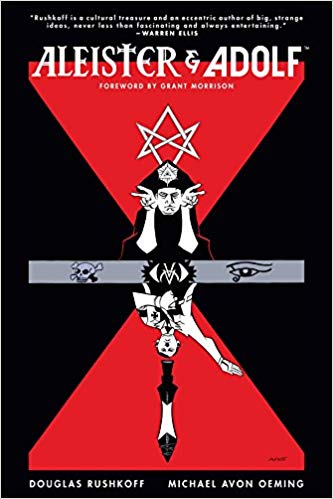
(Media theorist and documentarian Douglas Rushkoff weaves ...)
Media theorist and documentarian Douglas Rushkoff weaves a mind-bending tale of iconography and mysticism against the backdrop of a battle-torn Europe. In a story spanning generations, and featuring some of the most notable and notorious idealists of the 20th century, legendary occultist Aleister Crowley develops a powerful and dangerous new weapon to defend the world against Adolf Hitler's own war machine spawning an unconventional new form of warfare that is fought not with steel, but with symbols and ideas. Unfortunately, these intangible arsenals are much more insidious and perhaps much more dangerous than their creators could have ever conceived.
https://www.amazon.com/Aleister-Adolf-Douglas-Rushkoff/dp/1506701043/?tag=2022091-20
2016
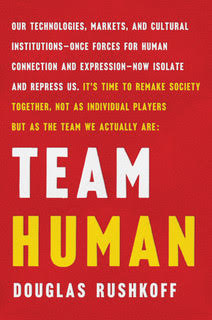
(Team Human is a manifesto - a fiery distillation of preem...)
Team Human is a manifesto - a fiery distillation of preeminent digital theorist Douglas Rushkoff’s most urgent thoughts on civilization and human nature. In one hundred lean and incisive statements, he argues that we are essentially social creatures and that we achieve our greatest aspirations when we work together - not as individuals. Yet today society is threatened by a vast antihuman infrastructure that undermines our ability to connect. Money, once a means of exchange, is now a means of exploitation; education, conceived as a way to elevate the working class, has become another assembly line; and the internet has only further divided us into increasingly atomized and radicalized groups.
https://www.amazon.com/Team-Human-Douglas-Rushkoff/dp/039365169X/?tag=2022091-20
2019
Douglas Mark Rushkoff was born on February 18, 1961, in New York City, New York, the United States to Marvin (a hospital administrator) and Sheila (a psychiatric social worker) Rushkoff.
Rushkoff graduated from Princeton University in 1983. He moved to Los Angeles and completed a Master of Fine Arts in Directing from the California Institute of the Arts. Later he took up a post-graduate fellowship from the American Film Institute. He was a PhD candidate at Utrecht University's New Media Program, writing a dissertation on new media literacies, which was approved in June 2012.
Douglas Rushkoff is an author, teacher, and documentarian who focuses on the ways people, cultures, and institutions create, share, and influence each other’s values. He is a Professor of Media Theory and Digital Economics at The City University of New York/Queens, where he founded the Laboratory for Digital Humanism. He is a columnist for Medium, technology and media commentator for CNN, a research fellow at the Institute for the Future, and a lecturer on media, technology, culture and economics around the world.
Douglas Rushkoff's first book. Free Rides: How to Get High without Drugs, was published in 1991, but his career as a journalist took off in 1994 with the publication of Cyberia: Life in the Trenches of Hyperspace and Media Virus!: Hidden Agendas in Popular Culture. The first volume established Rushkoff as a marketable media symbol of a technology-in-spired culture, while the second prompted at least one critic to compare him to Marshall McLuhan. Rushkoff was suddenly in demand as a media consultant to the United Nations Commission on World Culture and, for fees of five thousand dollars an hour and up, to various corporations. In 1995 Rushkoff published Children of Chaos: Surviving the End of the World As We Know It in London; it was released in the United States the following year as Playing the Future: How Kid's Culture Can Teach Us to Thrive in an Age of Chaos. Rushkoff s first novel. Ecstasy Club was published in 1997, and movie rights to it were optioned by a Hollywood producer.
Rushkoff wrote the prospectus for Cyberia on a flight to New York for a magazine editing job; he had noticed that many of his college classmates who had been involved with psychedelic drugs were working in the computer industry in Northern California, and he wanted to explore possible links between the new information revolution and mind-altering drugs. Cyberia, set in the San Francisco Bay Area, examines people whom Rushkoff sees as determined to re-define reality through “raves” (night-long techno-music and drug parties), paganism, hallucinogens, experimental art, and role-playing games. Computers figure prominently in these adventures, and modems establish communities of like-minded persons.
In Media Virus!, Rushkoff argues that “the datasphere” - contemporary media-saturated culture - is susceptible to media viruses in the form of controversies, ideas, and events that spread quickly throughout the system. Some of the examples he provides are the televised police beating of Rodney King in Los Angeles, Vice President Dan Quayle’s attack on the television character Murphy Brown for having a child out of wedlock, the O. J. Simpson murder trial, and television programs such as The Simpsons and Ren and Stimpy. These media viruses are often subversive of established points of view and they can, in the words of Randall Lyman in the online magazine Guardian Lit., “infect our minds just as biological viruses infect cells." Unlike many, Rushkoff is not worried that the media are controlled by governments and corporations because what he calls “media viruses" allow viewers and listeners to challenge the status quo - they allow countercultural politics to infiltrate mainstream media. In addition, the media are too complex and chaotic to be controlled by any one force.
In Rushkoff s 1995 work, the “children of chaos” are people who have grown up with computers controlled by computer “mice” and televisions operated with remote controls; with Barney, the purple dinosaur and Power Rangers; with skateboards and snowboard - “screenagers” as Rushkoff calls them. According to Rushkoff, they are the shapers of new, evolutionary environments in which change is constant and chaos is acceptable. They can process information faster than their elders, react more quickly, and understand the world on a much larger scale. In Playing the Future Rushkoff asserts that “screenagers” can lead everyone else “past linear thinking, duality, mechanism, hierarchy, metaphor, and God himself toward a dynamic, holistic, animistic, weightless, and recapitulated culture.”
In his 1997 novel, Ecstasy Club, Rushkoff spins a tale about a small cult having round-the-clock “rave” parties in an abandoned piano factory in Oakland, California. Fueled by quantities of drugs and armed with computers, they discover a method of time travel only to discover that they have been beaten to the punch by a conspiracy of governments, corporate saboteurs, and religious zealots.
Rushkoff's new book, a manifesto called Team Human, calls for the retrieval of human autonomy in a digital age. Prior to that, his book Throwing Rocks at the Google Bus: How Growth Became the Enemy of Prosperity argued that we have failed to build the distributed economy that digital networks are capable of fostering, and instead doubled down on the industrial age mandate of growth above all. His many best-selling books on media and popular culture have been translated to over thirty languages. They include Present Shock: When Everything Happens Now, Program or Be Programmed: Ten Commands for a Digital Age, a follow-up to his Frontline documentary, Digital Nation, and Life Inc, an analysis of the corporate spectacle, which was also made into a short, award-winning film.
Rushkoff has written and hosted three award-winning PBS Frontline documentaries - The Merchants of Cool looked at the influence of corporations on youth culture, The Persuaders, about the cluttered landscape of marketing, and new efforts to overcome consumer resistance, and Digital Nation, about life on the virtual frontier. Most recently, he made Generation Like, an exploration of teens, marketers, and social media.
Rushkoff's commentaries have aired on CBS Sunday Morning and NPR’s All Things Considered, and have appeared in publications from The New York Times to Time magazine. He wrote the first syndicated column on cyberculture for The New York Times and Guardian of London, as well as regular columns for Arthur, Discover Magazine and The Feature. He also hosted his own radio program on WFMU, The Media-Squat.
Rushkoff has taught regularly for NYU’s Interactive Telecommunications Program, The New School University, the MaybeLogic Academy and the Esalen Institute. He also lectures about media, art, society, and change at conferences and universities around the world.
Rushkoff has served on the National Advisory Board of the National Association for Media Literacy Education, The Harrington School of Communications and Media at University of Rhode Island, the Board of Directors of the Media Ecology Association, The Center for Cognitive Liberty and Ethics, the United Nations Commission on World Culture, and as a founding member of Technorealism. He is on the Advisory Boards of MeetUp.com, Epic Privacy Browser, Loomio.org, Liquid Information, Artizens, and World Wide Workshop. He has been awarded a Fullbright Scholarship, and Senior Fellowships by the Markle Foundation, the Center for Global Communications, and the International University of Japan. He served as an Advisor to the United Nations Commission on World Culture and regularly appears on TV shows from NBC Nightly News and Larry King to the Colbert Report and Bill Maher. He developed the Electronic Oracle software series for HarperCollins Interactive.
Rushkoff is on the board of several new media non-profits and companies and regularly speaks about media, society, and ethics to museums, governments, synagogues, churches, universities, and companies.
Rushkoff has also worked as a certified stage fight choreographer, an SAT tutor, and as keyboardist for the industrial band PsychicTV.
Douglas Rushkoff was named one of the “world’s ten most influential intellectuals” by the Massachusetts Institute of Technology. Among his twenty books, there are bestsellers Present Shock, Throwing Rocks and the Google Bus, Program or Be Programmed, Life Inc, and Media Virus. His book Coercion won the Marshall McLuhan Award, and the Media Ecology Association honored him with the first Neil Postman Award for Career Achievement in Public Intellectual Activity.
(Life Inc explains why we see our homes as investments rat...)
2009(Acclaimed writer and thinker Douglas Rushkoff, author of ...)
1973(Noted media pundit and author of Playing the Future Dougl...)
1998(In this groundbreaking book, acclaimed media scholar and ...)
2016(Douglas Rushkoff, author of eight books on media and cult...)
2004(This is the moment we’ve been waiting for, explains award...)
2004(Team Human is a manifesto - a fiery distillation of preem...)
2019(Media theorist and documentarian Douglas Rushkoff weaves ...)
2016(Douglas Rushkoff was one of the first social commentators...)
2005(The debate over whether the Net is good or bad for us fil...)
2010(Cursed by older generations, Generations X means a lot of...)
1994(The most virulent viruses today are composed of informati...)
1994In his book Nothing Sacred: The Truth About Judaism, Rushkoff explores the medium of religion and intellectually deconstructs the Bible and the ways that religion fails to provide true connectivity and transformative experiences.
Quotations:
"Self-actualization through technology meant leaving the body behind - but this was okay since, in keeping with the Gnostic tradition, the body was the source of human sin and corruption."
"Books have souls. Or so romantics like me tend to think."
"The phones are smarter but we are dumber."
"We are caught in a growth trap. This is the problem with no name or face, the frustration so many feel. It is the logic driving the jobless recovery, the low-wage gig economy, the ruthlessness of Uber, and the privacy invasions of Facebook."
"We are not being beaten by machines, but by a league of tech billionaires who have been taught to believe that human beings are the problem and technology is the solution. We must become aware of their agenda and fight it if we are going to survive."
Douglas Rushkoff is married to Barbara Kligman. They have one child Mamie Hannah Rushkoff who was born on December 22, 2004.
